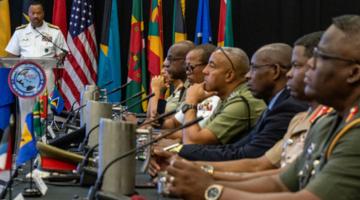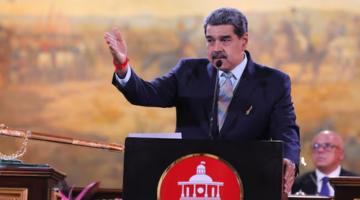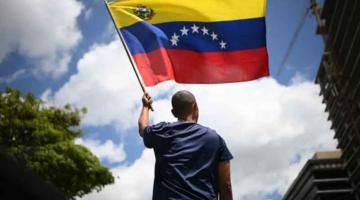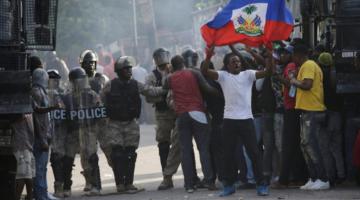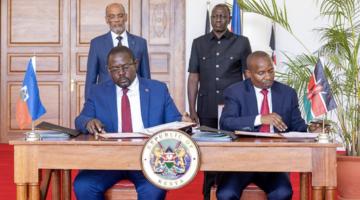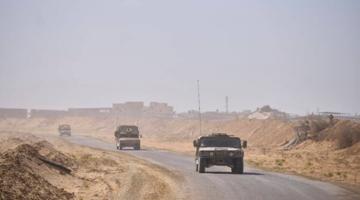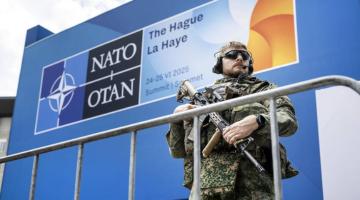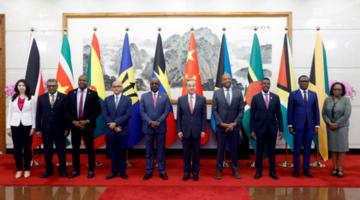The Black Alliance for Peace stands against the continued attempts to pursue U.N. occupation in Haiti and calls on people of conscience to support the Haitian people in the struggle to achieve true sovereignty.
Originally published in the Black Alliance for Peace.
The Black Alliance for Peace (BAP) urges the leaders of the nations of the Americas to oppose the upcoming United Nations’ decision to renew the Multinational Security Support Mission (MSS) in Haiti for another 12 months. Additionally, we call on these regional leaders to challenge the United States' proposal to convert this MSS into a full-fledged UN Peacekeeping mission by 2025.
On October 16, 2022, the Black Alliance for Peace (BAP) sent a letter urging the People’s Republic of China and the Russian Federation to “respect Haitian sovereignty and support the Haitian masses in their stand against the ongoing occupation of their country by foreign powers” by using their veto power and voting against another armed intervention and occupation into Haiti. In this letter, we outlined why the Haitian people perceive the United Nations Integrated Office in Haiti (BINUH) as a foreign occupation that has undermined their independence and sovereignty since 2004. On October 3, 2023, we and over 100 social and civic movements and organizations throughout the Americas, including in Haiti and the diaspora, issued a joint statement denouncing the UN Security Council's approval of the U.S.-orchestrated, Kenya-led MSS to Haiti. In these, we laid out demands in line with those of Haitian civic and social organizations. The Haitian people are resolute in their opposition to foreign intervention and remain steadfast in their commitment to self-determination.
As we articulated in our previous letter and statement, Haiti has endured a long history of U.S. intervention and occupation. The Haitian people recognize that their current challenges stem directly from the persistent meddling of the United States, the United Nations, and the Core Group. They are unequivocal in their belief that all U.S.-led foreign interventions over the past decades have been illegal and illegitimate. Notably, the current Multinational Security Support Mission (MSS) lacks legitimacy, having been authorized under the auspices of an illegitimate and U.S.-installed Prime Minister, Ariel Henry. Subsequently, the U.S., with the support of CARICOM, established a nine-member “Presidential Council” and Prime Minister, neither of which has any legal status or legitimacy in Haiti, all without the backing of the Haitian populace or the opportunity for a democratic selection process. Importantly, the U.S. demanded that those permitted on the “Presidential Council” consent to foreign intervention (the MSS). Thus, the entire process that led to the imposition of a foreign force in Haiti is fundamentally fraudulent.
We find it extremely worrisome that the U.S. has enlisted foreign proxies—such as police and military forces from Kenya, Jamaica, and Belize—to implement its foreign policy objectives in the region. It is equally alarming that these foreign forces, as part of the MSS, enjoy effective immunity for their actions in Haiti. Given the traumatic legacy of the last UN peacekeeping mission (MINUSTAH, 2004-2017), which was marred by violence, sexual exploitation, and a cholera epidemic, we view the MSS as a threat not only to Haiti’s sovereignty but also to the health and wellbeing of its people, particularly its children.
The Black Alliance for Peace also challenges the U.S. claim of addressing “gang violence” in Haiti. We assert that the U.S. and the so-called “international community” (including France and Canada) are fully aware that the current “gang violence” is funded and supported by Haiti’s oligarchs and the U.S.-backed political elite. This group imports weapons into the country and pays young men to instigate chaos, which is then used to manufacture consent for further invasion and occupation of Haiti. This is similar to the way the U.S. and France have increased the problem of “terrorism” in West and East Africa as a ruse to create U.S. military forces in that region, which we see in the U.S. Africa Command (AFRICOM). The awareness of these underlying dynamics is underscored by the sanctions imposed by the U.S. and Canada on several members of Haiti’s economic and political elite, including former Haitian president Michel Martelly, who was installed by the U.S.
In a time of global upheaval, marked by a live-streamed genocide in Gaza and violent clashes between cartels and police in Mexico, it is perplexing that the U.S., France, and Canada are advocating for foreign occupation of Haiti—a country facing internal conflicts that do not threaten regional or global security. We must question the U.S. insistence on maintaining a military presence in Haiti at this juncture.
As an anti-war and anti-imperialist organization, the Black Alliance for Peace warns that the U.S. aims to use Haiti as a staging ground for a permanent military base in the region to, as articulated in its foreign policy documents, secure “U.S. national security and interests” and manage rival powers, presumably Russia and China.
We once again call on your countries to respect Haitian sovereignty and support the Haitian masses in their ongoing struggle against the relentless occupation by foreign powers. Only the Haitian people can determine their own solutions. Their leaders must not be selected by the U.S. or any other foreign entity. Allowing continuous U.S. and Western control over Haiti’s political apparatus not only threatens to extinguish the nation’s hard-won sovereignty, but also weakens the sovereignty and self-determinative capacities of every other nation in the Caribbean, Central, and South America.
As we know, Haiti is a laboratory for U.S. and Western imperialist policies and practices of domination and intervention. What is visited upon Haiti will inevitably be visited upon other nations in the hemisphere. We have seen this in Honduras as the U.S. ambassador acts like a government representative in a foreign land, against the sovereignty of that nation and its President, Xiomara Castro. This is a strategy that was fine-tuned in Haiti under the Obama-Clinton foreign policy apparatus and continues to this day.
We ask that you, leaders throughout the Americas, reject the old colonial divisions that have made the region more susceptible to U.S. intervention, sabotage and neocolonial rule, and use regional mechanisms like CELAC to support Haitian sovereignty. As nations have stood in solidarity with Cuba, Venezuela, and Nicaragua against imperialist assaults, sanctions, and subterfuge aimed at undermining their sovereignty, so should you oppose the interventionist crimes and colonial impositions visited upon Haiti and its people by the U.S., UN and Core Group. As the overwhelming majority of nations and people of the Americas have decried the zionist genocide in Gaza and the ongoing violation of the sovereignty of Palestine and Lebanon, so should you fight against the imperialist actions that have resulted in instability, violence, and mass death in Haiti. There can be no “Zone of Peace” in the Americas if there is no peace and freedom for the people of Haiti.
The Black Alliance for Peace, in alignment with the wishes of the Haitian masses and their supporters, unequivocally opposes continued foreign armed intervention in Haiti. We stand firm in our demand for an end to the relentless meddling by the United States and Western powers in Haitian affairs. We urge your governments and nations to stand in solidarity with the Haitian people in their fight for liberation by opposing the extension of the MSS and any future plans to convert this mission into a UN peacekeeping operation.
Signed,
The Black Alliance for Peace, Haiti/Americas Team
---------------------------------------------------------------------------------------------------------------------------------------------
NO A LA INTERVENCIÓN MILITAR EXTRANJERA EN HAITÍ!
SÍ A LA AUTODETERMINACIÓN DEL PUEBLO HAITIANO!
Una Carta Abierta a los Líderes de las Naciones de las Américas
La Alianza Negra por la Paz (BAP) insta a los líderes de las naciones de las Américas a oponerse a la próxima decisión de las Naciones Unidas de renovar la Misión Multinacional de Apoyo a la Seguridad (MSS) en Haití por 12 meses adicionales. Además, hacemos un llamado a todos los líderes regionales a desafiar la propuesta de Estados Unidos de convertir esta MSS en una misión de mantenimiento de la paz de la ONU para el año 2025.
El 16 de octubre de 2022, la Black Alliance for Peace (BAP) envió una carta instando a la República Popular de China y a la Federación Rusa a “respetar la soberanía haitiana y apoyar a las masas haitianas en su lucha contra la ocupación continua de su país por parte de potencias extranjeras”, utilizando su poder de veto y votando en contra de otra intervención armada y ocupación en Haití. En esta carta, explicamos por qué el pueblo haitiano percibe a la Oficina Integrada de las Naciones Unidas en Haití (BINUH) como una ocupación extranjera que ha socavado su independencia y soberanía desde 2004. El 3 de octubre de 2023, junto con más de 100 movimientos sociales y organizaciones cívicas a lo largo de las Américas, incluyendo Haití y su diáspora, emitimos una declaración conjunta denunciando la aprobación por parte del Consejo de Seguridad de la ONU de la MSS liderada por Kenia y orquestada por Estados Unidos. En estos documentos, presentamos demandas en línea con las de las organizaciones cívicas y sociales haitianas. El pueblo haitiano es firme en su oposición a la intervención extranjera y permanece decidido en su compromiso con la autodeterminación.
Como señalamos en nuestra carta y declaración anteriores, Haití ha soportado una larga historia de intervenciones y ocupaciones por parte de Estados Unidos. El pueblo haitiano reconoce que sus desafíos actuales provienen directamente de la injerencia persistente de Estados Unidos, las Naciones Unidas y el Core Group. Son claros en su convicción de que todas las intervenciones extranjeras lideradas por EE.UU. en las últimas décadas han sido ilegales e ilegítimas. Cabe destacar que la actual Misión Multinacional de Apoyo a la Seguridad (MSS) carece de legitimidad, ya que fue autorizada bajo los auspicios de un Primer Ministro ilegítimo impuesto por EE.UU., Ariel Henry. Posteriormente, EE.UU., con el apoyo de CARICOM, estableció un “Consejo Presidencial” de nueve miembros y un Primer Ministro, ninguno de los cuales tiene estatus o legitimidad legal en Haití, y todo esto sin el respaldo del pueblo haitiano ni la oportunidad de un proceso de selección democrático. Es importante señalar que EE.UU. exigió que aquellos permitidos en el “Consejo Presidencial” consintieran la intervención extranjera (la MSS). Por lo tanto, todo el proceso que llevó a la imposición de una fuerza extranjera en Haití es fundamentalmente fraudulento.
Nos preocupa profundamente que EE.UU. haya reclutado proxies extranjeros, como fuerzas policiales y militares de Kenia, Jamaica y Belice, para implementar sus objetivos de política exterior en la región. Igualmente alarmante es que estas fuerzas extranjeras, como parte de la MSS, disfruten de una inmunidad efectiva por sus acciones en Haití. Dado el legado traumático de la última misión de paz de la ONU (MINUSTAH, 2004-2017), marcada por la violencia, la explotación sexual y una epidemia de cólera, consideramos la MSS como una amenaza no solo para la soberanía de Haití, sino también para la salud y el bienestar de su pueblo, en particular sus niños.
La Alianza Negra por la Paz también desafía la afirmación de EE.UU. de que está abordando la “violencia de pandillas” en Haití. Afirmamos que EE.UU. y la llamada “comunidad internacional” (incluyendo Francia y Canadá) son plenamente conscientes de que la actual “violencia de pandillas” está financiada y respaldada por los oligarcas haitianos y la élite política respaldada por EE.UU. Este grupo importa armas al país y paga a jóvenes para que generen caos, lo que luego se utiliza para fabricar consenso a favor de más invasiones y ocupaciones en Haití. Esto es similar a cómo EE.UU. y Francia han aumentado el problema del “terrorismo” en África Occidental y Oriental como un pretexto para crear fuerzas militares estadounidenses en esa región, como vemos en el Comando África de EE.UU. (AFRICOM). La conciencia de estas dinámicas subyacentes se refleja en las sanciones impuestas por EE.UU. y Canadá a varios miembros de la élite económica y política de Haití, incluyendo al expresidente haitiano Michel Martelly, quien fue instalado por EE.UU.
En un momento de agitación global, marcado por un genocidio transmitido en vivo en Gaza y enfrentamientos violentos entre cárteles y policías en México, resulta desconcertante que EE.UU., Francia y Canadá estén abogando por la ocupación extranjera de Haití, un país que enfrenta conflictos internos que no amenazan la seguridad regional o global. Debemos cuestionar la insistencia de EE.UU. en mantener una presencia militar en Haití en este momento.
Como organización antiimperialista y antibélica, la Alianza Negra por la Paz advierte que EE.UU. pretende utilizar Haití como plataforma para una base militar permanente en la región, con el fin de, como se articula en sus documentos de política exterior, asegurar la “seguridad e intereses nacionales de EE.UU.” y gestionar potencias rivales, presumiblemente Rusia y China.
Una vez más, hacemos un llamado a sus países para que respeten la soberanía haitiana y apoyen a las masas haitianas en su lucha continua contra la incesante ocupación de potencias extranjeras. Solo el pueblo haitiano puede determinar sus propias soluciones. Sus líderes no deben ser seleccionados por EE.UU. ni por ninguna otra entidad extranjera. Permitir que continúe el control de EE.UU. y Occidente sobre el aparato político de Haití no solo amenaza con extinguir la soberanía tan duramente ganada de la nación, sino que también debilita la soberanía y la capacidad de autodeterminación de todas las demás naciones del Caribe, Centro y Sudamérica. Sabemos que Haití es un laboratorio para las políticas imperialistas de EE.UU. y Occidente de dominación e intervención. Lo que se impone sobre Haití, inevitablemente se impondrá sobre otras naciones del hemisferio: lo hemos visto en Honduras, donde el embajador estadounidense actúa como un representante del gobierno en una tierra extranjera, en contra de la soberanía de esa nación y de su presidenta, Xiomara Castro. Esta es una estrategia perfeccionada en Haití bajo la política exterior de Obama-Clinton y que continúa hasta el día de hoy.
Pedimos que ustedes, líderes de toda América, rechacen las viejas divisiones coloniales que han hecho a la región más susceptible a la intervención, el sabotaje y el dominio neocolonial de EE.UU., y utilicen los mecanismos regionales como la CELAC para apoyar la soberanía haitiana. Así como las naciones se han solidarizado con Cuba, Venezuela y Nicaragua contra los asaltos imperialistas, las sanciones y la subversión que buscan socavar su soberanía, así deben oponerse a los crímenes intervencionistas e imposiciones coloniales que Estados Unidos, la ONU y el Core Group han impuesto sobre Haití y su pueblo. Así como la mayoría de las naciones y pueblos de las Américas han denunciado el genocidio sionista en Gaza y la violación continua de la soberanía de Palestina y Líbano, deben luchar contra las acciones imperialistas que han resultado en inestabilidad, violencia y muerte masiva en Haití. No puede haber una “Zona de Paz” en las Américas si no hay paz y libertad para el pueblo de Haití.
La Alianza Negra por la Paz, en alineación con los deseos de las masas haitianas y sus seguidores, se opone de manera inequívoca a la continua intervención armada extranjera en Haití. Mantenemos firme nuestra demanda de poner fin a la incesante intromisión de Estados Unidos y las potencias occidentales en los asuntos haitianos. Instamos a sus gobiernos y naciones a solidarizarse con el pueblo haitiano en su lucha por la liberación, oponiéndose a la extensión de la MSS y a cualquier plan futuro de convertir esta misión en una operación de mantenimiento de la paz de la ONU.
Firmado,
La Alianza Negra por la Paz, Equipo Haití/Américas

